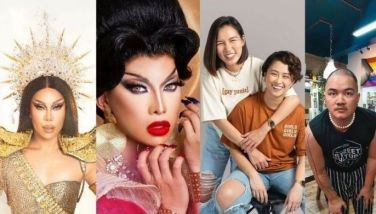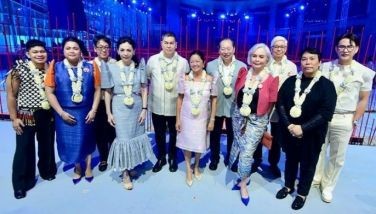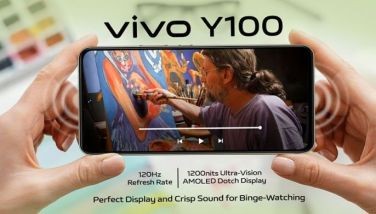UNESCO’S 32nd Consultative: Meeting focuses on its new alliances
July 4, 2002 | 12:00am
A point of awareness By Preciosa S. Soliven
JAKARTA – It was a steamy hot 33oC Sunday morning in this metropolitan city of 11 million when UNESCO Regional Director Dr. Sheldon Shaeffer called the two new "cluster countries" of Bangkok (Vietnam, Cambodia, Laos and Thailand) and Jakarta (Philippines, Malaysia and Indonesia) represented by their National Commission Secretaries-General, accompanied by an average of two or three commissioners. This was done a day earlier before the Paris Director General’s consultative meeting the following week where Hans D’Orville represented UNESCO Director General Koichiro Matsuura.
Bureau Chairman Dr. Arief Rachman, a well-known good humored Indonesian educator-lecturer set the tone right as he invited "the dialogue of civilizations" to start addressing each other as elder brothers "Bapa" and sisters "Ibu". The 21 participants led by seven UNESCO country secretaries-general joined the following week 34 other "Sec-Gens" accompanied by the national commissioners of various expertise.
By virtue of the Charter of the National Commissions adopted by resolution of the General Conference at its 20th session in 1978, the National Commissions now act as advisory, liaison, implementing, information and evaluation bodies for UNESCO’s programmes.
At the dawn of the 21st century, these evolving and varied functions have acquired a new dimension to deal with the present challenges arising from the impact of poverty and information technology. The latest Human Development Indicators (HDIs), which list the issues of common concern to all nations for their prosperity and progress, require innovative approaches to policy-making. Thus, this consultative meeting is necessary.
After ten years of EFA (Education For All), while enrollment may have improved, the quality of education remains mediocre. The hundred percent universal access to education has not yet been achieved neither has the primary right of children to quality education and parenting. Innovation is called for, but there is nothing new in Secretary Roco’s Makabayan curriculum except the label. The contents are the same.
UNESCO now insists on an innovative education technology with a track record. The observed "best-practice" is the switch from the traditional pedagogical system to the psychologically based educational system which recognizes the true nature of child development and matches this with a revolutionary hands-on curriculum and teacher-training. This includes a superior program in math and science that could catapult the Philippines from its 77th rank among 174 countries (according to the Human Development Report of UNDP 1999).
Meantime for the Science Sector, the problem of national calamities such as tsunamis, earthquakes, volcanic eruptions, etc. are seen as the continuous shaping of planet Earth. As these cause thousands to lose their lives and be left homeless, UNESCO addresses this with regional conferences such as "Expecting the Unexpected" held recently in Manila.
The Thailand Commission headed by Sec-Gen Savitri Suwansathit referred to the "drug-trafficking" problem, while Cambodia Sec-Gen Theany Tan spoke of holding a conference with Thailand regarding illicit smuggling of cultural properties.
China Sec-Gen Shuyun Shi noted that "family" must be added as the fundamental unit to human development. The others unanimously supported this. Lao Sec-Gen Heng Daovannary thought of the urgent need to input Constitution for this is suggestive of the nation’s capacity and potential.
Like a lone voice in the wilderness, Philippine Commissioner Atty. Jose Sison brought up the problem of injustice which has nurtured a culture of corruption in many developing countries – a situation which further oppresses the poor. This was seconded by Chairperson "Bapa" Rachman. Indonesians, he says, tend to refer to democracy as "demo-crazy".
Our Professor Felipe de Leon, Chairman of the Culture Committee, cautions about the downside of information technology (LT) specifically for the youth who is often without a mature sense of discrimination as to what is good and evil when information suddenly spills out of the "Pandora’s Box" of IT. Psychologically, it gives the wrong illusion of power as it encourages instant gratification at the push of the button.
Finally, Malaysian Sec-Gen Mohanan Nair voices the worry of many, "How can ICT be the solution to country prosperity without electricity?" In that situation, UNESCO promotes community radio instead.
In pursuit of the UN Millennium Development Goals UNESCO is to cooperate fully with other sister organizations of the UN system. The agencies with funds are the UNDP (United Nations Development Program), UNICEF (United Nations International Children’s Education Fund), FAO (Food Authority Organization), WHO (World Health Organization) and ILO (International Labor Organization), while UNESCO is not a funding agency. It is a lead agency for education, sciences, culture and communication projects to help solve non-political problems of mankind. For every biennium program and budget, UNESCO uses about US$60 million every year for Secretariat work and the think tank research offices in Paris and the field offices all over the world. Approximately US$450 million used for Participation Programs given to 178 member states are provided by the World Bank, IMF, bilateral and multilateral grants from donor countries.
The Medium-Term Strategy emphasizes UNESCO’s role as: a laboratory of ideas; a standard-setter; a clearing-house; a capacity-builder in Member States; and, a catalyst for international cooperation.
UNESCO is the only Specialized Agency of the United Nations to provide for the establishment of a National Commission in each of its Member States. Article VII of the UNESCO Constitution, adopted in 1945, states that these bodies shall: Be broadly representative of the government and of the country’s expertise in educational, scientific and cultural fields; Act in an advisory capacity to their national delegations to the General Conference, to the Executive Board and in matters relating to the Organization.
The establishment of National Commissions stems from the idea that if UNESCO is to work effectively in its fields of competence, it must involve the intellectual and scientific communities of its Member States in its activities.
The Philippine UNESCO National Commission’s Education Committee is headed by DepEd Secretary Raul Roco, CHED Chairperson Dr. Ester Garcia and SEAMEO-INNOTECH (Southeast Asian Ministers of Education — Regional Center for Innovation Technology) executive director Dr. Linda Pefianco. The Science and Technology Committees include Philippine Federation for Environmental Concerns Coordinator Dr. Delfin Ganapin, Marine Science expert Dr. Miguel Fortes, and Philippine Social Science Council Executive Director Dr. Virginia Miralao.
The Culture Committee chaired by Professor Felipe de Leon Jr., a theater, music and ASEAN culture expert, together with NCCA (National Commission for Culture and the Arts) Chairperson Evelyn Pantig. The Committee looks after the five World Heritage Sites of the Philippines, principally the Ifugao Rice Terraces. The Culture Committee will hold a Regional Conference this August on "Culture and Sustainable Development". The Communication Committee involves Information For All International Committee member Dr. Florangel Braid, the new president of Asian Institute of Journalism Dr. Cora Claudio, television personality Che-Che Lazaro, IBC-13 Chairman Serge Remonde.
Future challenges: Synergy through partnerships, alliances and linkages
UNESCO’s Medium Term Strategy (2002-2007) will focus on two main cross-cutting themes: poverty eradication and information technology for a "knowledge society".
Mary-Louise Kearney, director of the Division of Relations with National Commissions and New Partnerships defines the latter, "New Partnerships mobilize the various resources of the business community (expertise, equipment, services and funding) for the achievement of UNESCO’s goals…"
The complexity of globalization requires outreach to partners, both new and established, whose expertise will help share the benefits of this phenomenon on a more equitable basis among all countries and their citizens. The business community and its associations will play an increasingly important role in achieving the global development objectives reflected in UNESCO’s Medium-Term Strategy (2002-2007).
UNESCO cooperates worldwide with over 300 business corporations and organizations that are committed to the goals of sustainable human development and social responsibility. UNESCO’s action in this area links to the United Nations Global Compact, which acts out the principles for outreach to the business community. This initiative was launched by the UN in the year 2000 during the Millennium Assembly.
The following groups work together with UNESCO to address global development issues: the World Bank Enterprise Outreach Services in Europe (EOS); World Business Council for Sustainable Development (WBCSD); International Chamber of Commerce (ICC); Organization for Economic Cooperation and Development (OECD); and, Global Alliance for Cultural Diversity programs the promotion of cultural industries specifically in developing countries.
E7 – Members are nine of the world’s leading electric utilities from G7 countries. Baker & McKenzie gives strategic and legal advice on partnership policies. L’Oreal focuses on women in Science programs. Rhone-Poulenc/Aventis underscores the preservation of World Heritage sites. Hachette Distribution Services disseminates communication campaign on cultural diversity. Foundation Internationale Carrefour gives programs for the education of children in difficult circumstances. Felissimo Foundation (Japan) provides grants to community-based activities – Future Generations Project. AHPADA-ASEAN Handicraft Promotion and Development Association grants funding and expertise to UNESCO Bangkok.
(For more information please e-mail at exec@obmonte ssori.edu.ph)
JAKARTA – It was a steamy hot 33oC Sunday morning in this metropolitan city of 11 million when UNESCO Regional Director Dr. Sheldon Shaeffer called the two new "cluster countries" of Bangkok (Vietnam, Cambodia, Laos and Thailand) and Jakarta (Philippines, Malaysia and Indonesia) represented by their National Commission Secretaries-General, accompanied by an average of two or three commissioners. This was done a day earlier before the Paris Director General’s consultative meeting the following week where Hans D’Orville represented UNESCO Director General Koichiro Matsuura.
Bureau Chairman Dr. Arief Rachman, a well-known good humored Indonesian educator-lecturer set the tone right as he invited "the dialogue of civilizations" to start addressing each other as elder brothers "Bapa" and sisters "Ibu". The 21 participants led by seven UNESCO country secretaries-general joined the following week 34 other "Sec-Gens" accompanied by the national commissioners of various expertise.
At the dawn of the 21st century, these evolving and varied functions have acquired a new dimension to deal with the present challenges arising from the impact of poverty and information technology. The latest Human Development Indicators (HDIs), which list the issues of common concern to all nations for their prosperity and progress, require innovative approaches to policy-making. Thus, this consultative meeting is necessary.
After ten years of EFA (Education For All), while enrollment may have improved, the quality of education remains mediocre. The hundred percent universal access to education has not yet been achieved neither has the primary right of children to quality education and parenting. Innovation is called for, but there is nothing new in Secretary Roco’s Makabayan curriculum except the label. The contents are the same.
UNESCO now insists on an innovative education technology with a track record. The observed "best-practice" is the switch from the traditional pedagogical system to the psychologically based educational system which recognizes the true nature of child development and matches this with a revolutionary hands-on curriculum and teacher-training. This includes a superior program in math and science that could catapult the Philippines from its 77th rank among 174 countries (according to the Human Development Report of UNDP 1999).
Meantime for the Science Sector, the problem of national calamities such as tsunamis, earthquakes, volcanic eruptions, etc. are seen as the continuous shaping of planet Earth. As these cause thousands to lose their lives and be left homeless, UNESCO addresses this with regional conferences such as "Expecting the Unexpected" held recently in Manila.
China Sec-Gen Shuyun Shi noted that "family" must be added as the fundamental unit to human development. The others unanimously supported this. Lao Sec-Gen Heng Daovannary thought of the urgent need to input Constitution for this is suggestive of the nation’s capacity and potential.
Like a lone voice in the wilderness, Philippine Commissioner Atty. Jose Sison brought up the problem of injustice which has nurtured a culture of corruption in many developing countries – a situation which further oppresses the poor. This was seconded by Chairperson "Bapa" Rachman. Indonesians, he says, tend to refer to democracy as "demo-crazy".
Our Professor Felipe de Leon, Chairman of the Culture Committee, cautions about the downside of information technology (LT) specifically for the youth who is often without a mature sense of discrimination as to what is good and evil when information suddenly spills out of the "Pandora’s Box" of IT. Psychologically, it gives the wrong illusion of power as it encourages instant gratification at the push of the button.
Finally, Malaysian Sec-Gen Mohanan Nair voices the worry of many, "How can ICT be the solution to country prosperity without electricity?" In that situation, UNESCO promotes community radio instead.
The Medium-Term Strategy emphasizes UNESCO’s role as: a laboratory of ideas; a standard-setter; a clearing-house; a capacity-builder in Member States; and, a catalyst for international cooperation.
The establishment of National Commissions stems from the idea that if UNESCO is to work effectively in its fields of competence, it must involve the intellectual and scientific communities of its Member States in its activities.
The Philippine UNESCO National Commission’s Education Committee is headed by DepEd Secretary Raul Roco, CHED Chairperson Dr. Ester Garcia and SEAMEO-INNOTECH (Southeast Asian Ministers of Education — Regional Center for Innovation Technology) executive director Dr. Linda Pefianco. The Science and Technology Committees include Philippine Federation for Environmental Concerns Coordinator Dr. Delfin Ganapin, Marine Science expert Dr. Miguel Fortes, and Philippine Social Science Council Executive Director Dr. Virginia Miralao.
The Culture Committee chaired by Professor Felipe de Leon Jr., a theater, music and ASEAN culture expert, together with NCCA (National Commission for Culture and the Arts) Chairperson Evelyn Pantig. The Committee looks after the five World Heritage Sites of the Philippines, principally the Ifugao Rice Terraces. The Culture Committee will hold a Regional Conference this August on "Culture and Sustainable Development". The Communication Committee involves Information For All International Committee member Dr. Florangel Braid, the new president of Asian Institute of Journalism Dr. Cora Claudio, television personality Che-Che Lazaro, IBC-13 Chairman Serge Remonde.
Future challenges: Synergy through partnerships, alliances and linkages
UNESCO’s Medium Term Strategy (2002-2007) will focus on two main cross-cutting themes: poverty eradication and information technology for a "knowledge society".
Mary-Louise Kearney, director of the Division of Relations with National Commissions and New Partnerships defines the latter, "New Partnerships mobilize the various resources of the business community (expertise, equipment, services and funding) for the achievement of UNESCO’s goals…"
The complexity of globalization requires outreach to partners, both new and established, whose expertise will help share the benefits of this phenomenon on a more equitable basis among all countries and their citizens. The business community and its associations will play an increasingly important role in achieving the global development objectives reflected in UNESCO’s Medium-Term Strategy (2002-2007).
UNESCO cooperates worldwide with over 300 business corporations and organizations that are committed to the goals of sustainable human development and social responsibility. UNESCO’s action in this area links to the United Nations Global Compact, which acts out the principles for outreach to the business community. This initiative was launched by the UN in the year 2000 during the Millennium Assembly.
E7 – Members are nine of the world’s leading electric utilities from G7 countries. Baker & McKenzie gives strategic and legal advice on partnership policies. L’Oreal focuses on women in Science programs. Rhone-Poulenc/Aventis underscores the preservation of World Heritage sites. Hachette Distribution Services disseminates communication campaign on cultural diversity. Foundation Internationale Carrefour gives programs for the education of children in difficult circumstances. Felissimo Foundation (Japan) provides grants to community-based activities – Future Generations Project. AHPADA-ASEAN Handicraft Promotion and Development Association grants funding and expertise to UNESCO Bangkok.
(For more information please e-mail at exec@obmonte ssori.edu.ph)
BrandSpace Articles
<
>
- Latest
- Trending
Trending
Latest
Trending

By BABE’S EYE VIEW FROM WASHINGTON D.C. | By Ambassador B. Romualdez | 14 hours ago

By POINT OF VIEW | By Dorothy Delgado Novicio | 14 hours ago
Latest

By AT GROUND LEVEL | By Satur C. Ocampo | 1 day ago

By The broader view | By Harry Roque | 1 day ago
Recommended

June 16, 2024 - 12:00am


























